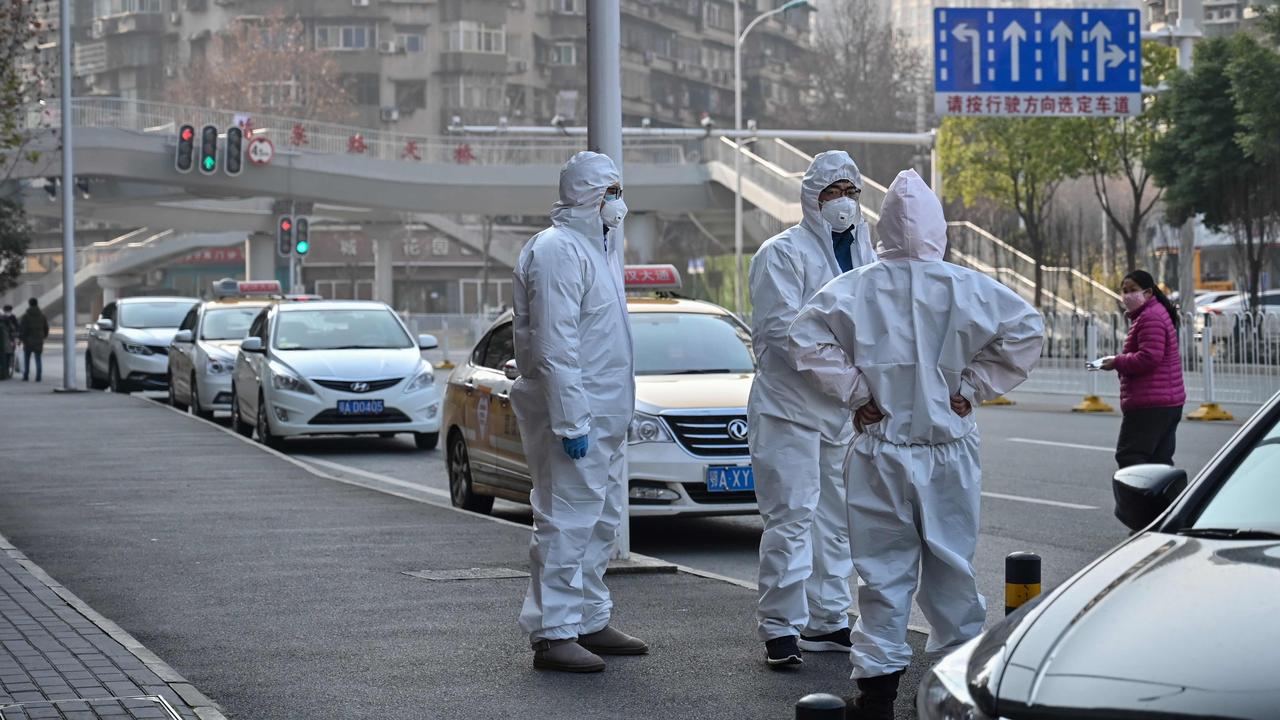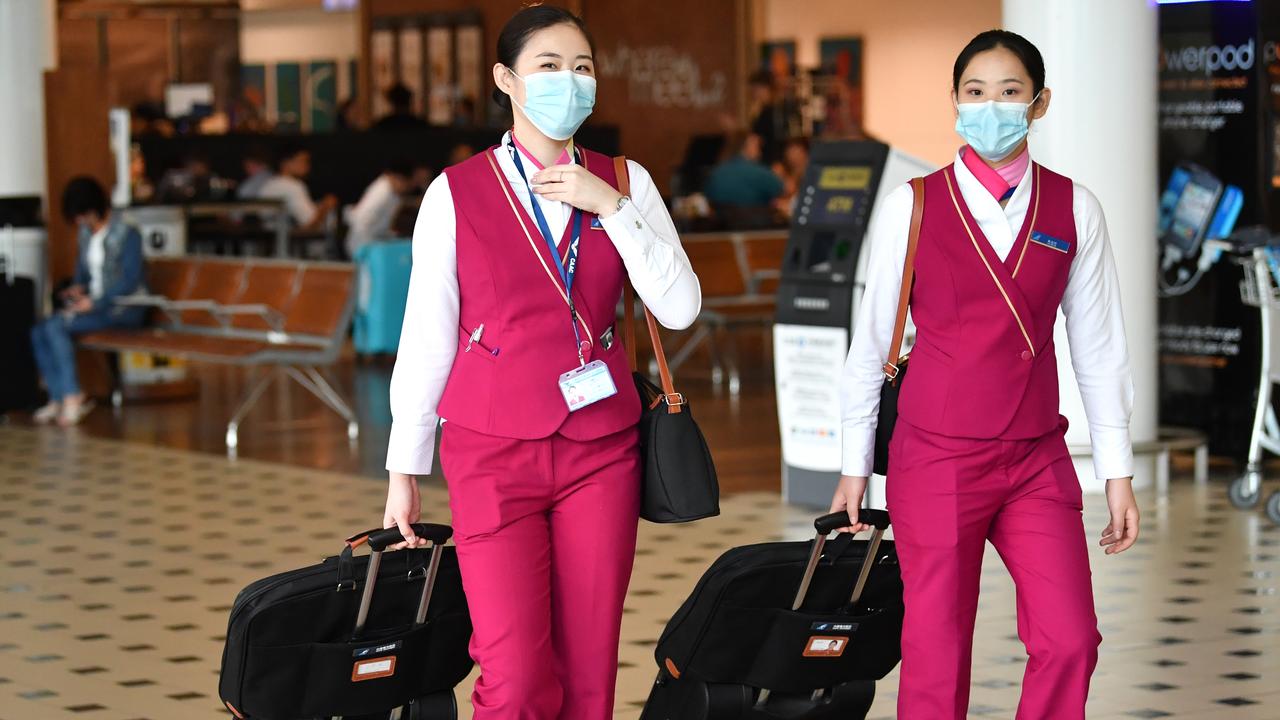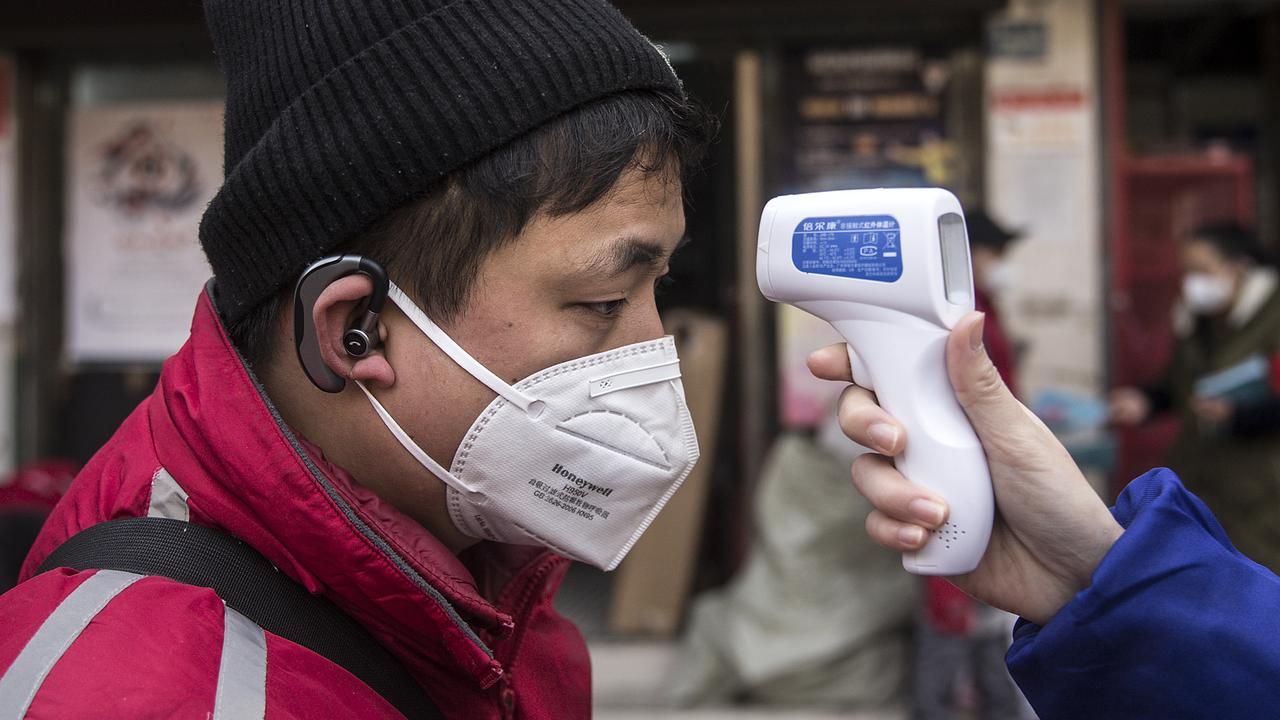Measures to stop the spread of ‘pandemic’ coronavirus outbreak
Countries are taking drastic measures to stop the spread of coronavirus as the outbreak takes on ‘pandemic’ proportions.
It has infected more than 11,000 people and travelled to almost every continent in the world in just one month — the spread of coronavirus is simply staggering.
The virus has already eclipsed the spread of severe acute respiratory syndrome (SARS), which took nine months to infect 8098 people worldwide.
On Thursday (local time) the World Health Organisation declared the outbreak a “Public Health Emergency of International Concern”.
It comes after evidence firmed that coronavirus could be transmitted before someone showed symptoms of the disease.
While China’s National Health Commission Minister Ma Xiaowei announced on Sunday it was possible for people to spread coronavirus before they had symptoms, this was greeted with scepticism by Australian authorities.
However, on Thursday, Australian Deputy Chief Medical Officer, Professor Paul Kelly confirmed that experts now believed this was possible.
“We are now sure that there is a possibility that people can transmit this virus before they become symptomatic,” Prof Kelly said.
“This is quite a change in what we understand about the virus and it has led to some different ways that we are dealing with the public health issues but I do want to reassure the Australian public, this is a very precautionary measure.”
The development could have serious ramifications.
Earlier this week, Malik Peiris, chair in virology at the University of Hong Kong, said if it turned out that the new coronavirus could be spread by people who don’t show any symptoms, “a pandemic is a scenario that we have to consider”.
Professor Ramon Shaban of the University of Sydney and Western Sydney Local Health District told news.com.au that the coronavirus outbreak was already technically a pandemic.
“In technical terms it is a pandemic as there is the occurrence of multiple infections at multiple sites,” he said.
He noted that WHO’s declaration of a public health emergency was simply the contemporary language being used to describe a pandemic.
RELATED: Follow updates on the coronavirus outbreak
RELATED: Staggering spread of coronavirus compared to SARS

Previous pandemics have included smallpox, tuberculosis, the Black Death, HIV and H1N1, or “swine flu” as it’s commonly called.
Prof Shaban said the fact that the disease could be spread before someone showed symptoms would also make it harder to track and to manage.
Australia’s Chief medical officer Brendan Murphy said the world would soon know if containment was realistic.
“It is not yet contained in China but they are making herculean efforts to do so. It is contained very well in all the countries where it has been exported to, including Australia,” he told ABC television.
While the WHO declaration may see new measures introduced to stop the spread of the virus, countries and companies around the world are already taking drastic measures.
FLIGHTS GRIND TO A HALT
Airlines are taking matters into their own hands by cancelling flights to and from China.
On Thursday, the pilots union in the US sued American Airlines to stop the carrier from flying to China and told members not to operate flights there because of the outbreak.
The Allied Pilots Association, which represents American’s 15,000 pilots, asked a state district court in Dallas for an injunction to halt the flights immediately.
Other American airlines, United Airlines and Delta Air Lines, had already announced they would reduce the number of flights to China.
British Airways and Germany’s Lufthansa have already stopped flights to China, and Air France-KLM also suspended services after its cabin crews voiced unease about infection.
Virgin Atlantic announced on Thursday it would suspend its daily operations to Shanghai from Sunday for two weeks because of the safety of customers and staff and a declining demand for tickets.
Other major carriers have kept flying to China, but protective masks and shorter layovers designed to reduce exposure have done little to reassure crews.

Thai Airways is hosing its cabins with disinfectant spray between China flights and allowing crew to wear masks and gloves.
Delta Air Lines is operating fewer China flights and shorter layovers, with food deliveries so crew can stay in their hotels.
Korean Air Lines Co Ltd and Singapore Airlines are sending additional crew to fly each plane straight back, avoiding overnight stays.
Australia’s airline Qantas is continuing its China services but is monitoring the situation.
CHINA’S ‘VERY STRONG’ EFFORTS
What other country in the world can build a 1000-bed hospital in 48 hours and lock down a city of 11 million?
In declaring a public health emergency, WHO recognised China’s “very strong measures” to contain the virus.
“The main reason for this declaration is not because of what is happening in China, but because of what is happening in other countries,” WHO director-general Tedros Adhanom Ghebreyesus told reporters on Friday morning.
“Our greatest concern is the potential for the virus to spread to countries with weaker health systems, and which are ill-prepared to deal with it.”
Wuhan, which has been the epicentre of the outbreak, has been virtually shut down with train, plane, rail, long-distance bus and ferry services all blocked. Cars and trucks are being inspected at roadblocks.
Entertainment venues including karaoke bars, movie theatres and internet cafes in several parts of Hubei were also closed.
Access has also been cut off to neighbouring cities in the central province of Hubei that include Huanggang, with 7 million people; Ezhou; Chibi; Qianjiang; Zhijiang; Jingmen; Xiantao; Xiaogan and Huangshi. Their combined population is about 33 million.
Travel restrictions have been placed on much of Hubei province, impacting about 60 million people.
China also built a 1000-bed facility in just 48 hours to use as a hospital for coronavirus patients.
In the capital, Beijing, major public events were cancelled, including traditional temple fairs that are a staple of Lunar New Year celebrations.
Beijing’s Forbidden City, Shanghai Disneyland and a slew of other tourist attractions have been closed indefinitely.
ULTRAVIOLET LIGHT DISINFECTION
Australian horse trainer Rui Severino told 7.30 he has to have his temperature checked every morning before he is allowed to start work in Wuhan, and he is also disinfected in a special room with a UV light.
Prof Shaban said ultraviolet light can be used to destroy organisms but it’s not a method that medical professionals use as a frontline method to decontaminate surfaces.
“We use a general clean, followed by a bleach clean and a range of chemicals known to kill viruses,” he said.
The effectiveness of UV disinfection relies on line-of-sight exposure and it’s not 100 per cent effective at sterilisation.
RELATED: Coronavirus is being spread by ‘droplets’
‘DO NOT TRAVEL’
On Friday, the United States raised its advisory status to the highest level of alert possible, telling citizens “do not travel” to China.
In Australia, people are being advised to reconsider any travel to China.
The Smart Traveller website says “due to the outbreak of novel coronavirus we now advise you ‘reconsider your need to travel’ to China overall and ‘do not travel’ to Hubei Province”.
RUSSIA CLOSES BORDER WITH CHINA
Russian Prime Minister Mikhail Mishustin issued a decree ordering the temporary closure of the border, which extends for 4,200 kilometres.
All train traffic between Russia and China has also been halted except for one train connecting Moscow and Beijing.
STORES, RESTAURANTS CLOSE
Swedish furniture and home goods retailer IKEA has closed all its mainland China stores to protect customers and staff from the outbreak.
McDonald’s has shuttered restaurants in five Chinese cities: Wuhan, Ezhou, Huanggang, Qianjiang and Xiantao
The fast-food giant is also taking the temperature of all employees when they arrive at work and sending anyone with a fever or cold symptoms home. Delivery drivers are required to wear masks.
McDonald’s is also disinfecting high-contact surfaces more frequently at its Chinese establishments, including tables, chairs door handles and self-ordering kiosks.
Fiat Chrysler has banned corporate travel in areas locked down by the Chinese government due to the virus, while GM has restricted travel to all of China unless it is “business critical and approved in advance,” a company statement said.

QUARANTINE, WITH A VIEW
Many countries have also evacuated their citizens from China and will quarantine them for 14 days.
European passengers are expected to reach France on Friday but as compensation for being quarantined for two weeks they will be put up at a southern vacation resort in the small town of Carry-le-Rouet, with a view of the Mediterranean Sea.
Its mayor protested the move, fearing it could keep people away from a local sea urchin culinary festival this weekend, but the French government simply requisitioned the resort, a media spokeswoman said.
In contrast, American evacuees from China are being kept at a military facility.
Meanwhile, Australia is also in talks with China to evacuate its citizens and quarantine them on Christmas Island, at a former detention centre for refugees.
VACCINE IN DEVELOPMENT
Australian scientists successfully managed to replicate the coronavirus in laboratory conditions this week and this will help speed up the development of a vaccine.
However, Prof Shaban said developing a vaccine generally took months or sometimes years.
“It’s not something you can ordinarily bring online in a few weeks,” he said.
Once developed, vaccines also need to be tested for safety and effectiveness and it also takes time to manufacture in larger quantities.
“It’s good for longer-term preventive processes.”
BED REST, AND STAY AWAY FROM OTHERS
There is no medication to cure the coronavirus, those who contract the disease must simply ride it out, much like a cold.
You can take medication for the symptoms but antibiotics aren’t effective because it’s a virus.
“You should stay home, rest and drink a lot of fluids,” Prof Shaban said.
Most importantly you should isolate yourself from others so they don’t get sick as well.
Although many people are wearing masks to protect themselves, it’s actually more important to practice good hand hygiene because coronavirus is not an airborne virus and is actually being spread through droplets.
Prof Shaban said if you don’t clean your hands properly and then rub your eye, mouth or nose, this can actually pass on the infection, even if you have a mask on.
He said the best thing to do to avoid infection is to wash your hands regularly, use an alcohol based rub afterwards and avoid large crowds where individuals may be unwell.
“These are common responses to outbreaks of this nature.”
- with wires
Continue the conversation @charischang2 | charis.chang@news.com.au




